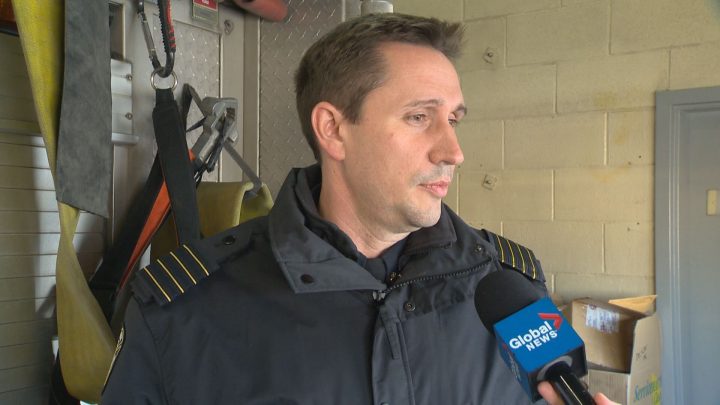Regina Fire chief Layne Jackson says the department is doing everything it can to avoid a similar situation to what happened in Saskatoon earlier in the month — when firefighters came into contact with someone being tested for COVID-19.

Four firefighters from Saskatoon’s Fire Station No. 4 had to go into self-isolation as a result, but were eventually cleared and returned to work.
“I’ve spent a lot of time on the phone with the Saskatoon fire chief and listening to their experience and what they went through up there. I’m happy it turned out to be a good outcome for them,” Jackson said.
“We have some contingency plans in place for that, should we have the need for an emergency quarantine or isolation.
“We’re communicating to all the staff regularly and updating them on the situation, updating them on our preparation and sending out operation bulletins and operation flashes on how to adjust procedures and how to adjust tactics when going into these types of situations.”
He said that for the most part, it’s business as usual for all emergency responders.
“We’re still responding to all our emergency and all of our requests for service, but we’re taking extra precautions,” Jackson said.
“We have over 100 paramedics on the fire department and we respond to many emergency medical calls. We were definitely on top of this early on making sure the crews had the equipment.”
As for morale, Jackson said his team is doing well and are focused on serving the community.
“I want to thank all of our emergency crews and staff here at the department. They’ve all been remarkable during this situation,” Jackson said.
“Our people are just like anybody else. They have families, they have worries and they get sick themselves. The staff are here and they are … up for the challenge. I’m pretty proud of them.”
City of Regina’s emergency operation centre
Regina’s fire department is also in charge of activating and operating the city’s emergency centre, in case of a major event.
Jackson said COVID-19 has presented the city with a unique situation.
“What makes the situation so complicated…we would usually have other departments that can step in and be relied upon when we are having a local emergency,” Jackson said.
“In this situation, all the jurisdictions whether it’s federal, provincial or sister of brother cities they’re all dealing with the same emergency, concurrently. It adds an element of complication because that’s a non-traditional approach.”
Whether it’s transit, waterworks, waste collection, planning and development or even the city’s communications team, Jackson said it’s been great watching the departments come together during this pandemic.
“I’m always excited about the work emergency services is doing, but I’m really excited when I see all the other critical services in the city coming together and really stepping up,” Jackson said.
Jackson said the city has some great people working inside its emergency operation centre focused on dealing with COVID-19.
City of Moose Jaw services
In Moose Jaw, the city said it has been challenging for emergency responders to try and maintain safe distances while attending scenes, having to deploy more resources.
The city also said it hasn’t seen a noticeable spike in water use, but waste has increased. It’s actively monitoring the situation to see if they need to boost collection efforts.
Questions about COVID-19? Here are some things you need to know:
Health officials caution against all international travel. Returning travellers across Canada are legally obligated to self-isolate for 14 days, beginning March 26, in case they develop symptoms and to prevent spreading the virus to others. In Saskatchewan, international travellers are already required to self-isolate for 14 days upon their return to the province.
Symptoms can include fever, cough and difficulty breathing — very similar to a cold or flu. Some people can develop a more severe illness. People most at risk of this include older adults and people with severe chronic medical conditions like heart, lung or kidney disease. If you develop symptoms, contact public health authorities.
To prevent the virus from spreading, experts recommend frequent handwashing and coughing into your sleeve. They also recommend minimizing contact with others, staying home as much as possible and maintaining a distance of two metres from other people if you go out.
For full COVID-19 coverage from Global News, click here.





Comments